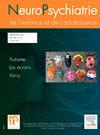2015 年 11 月 13 日的袭击对受影响平民的子女和亲子关系的影响
Q4 Medicine
Neuropsychiatrie de l''Enfance et de l''Adolescence
Pub Date : 2024-11-01
DOI:10.1016/j.neurenf.2024.06.002
引用次数: 0
摘要
导言:2015 年 11 月 13 日恐怖袭击发生后 8 至 12 个月期间,法国卫生部开展了一项基于网络的流行病学调查(ESPA 13 Novembre)。这样做的目的是为了探究袭击对直接受影响的平民和救灾人员造成的创伤后心理影响,以及他们对医疗服务的使用情况。调查采用了一系列封闭式问题和若干开放式问题的形式。我们在此对平民对以下具体问题的回答进行分析:"如果您有孩子,您能否告诉我们您认为您的经历是否对他们或您与他们的关系产生了影响?我们对平民对这一具体问题的回答进行了专题分析,并通过数据还原建立了一般主题。结果分析揭示了四大主题,分别涉及遭受恐怖袭击对亲子关系的影响、父母角色的变化、子女的反应,以及他们试图保护子女的方式。讨论父母们强调了他们的心理变化、不安、对外界的恐惧以及对子女安全的担忧。他们从压力、不安全感、心理障碍,甚至出现真正的心理失调等方面讨论了孩子受到攻击的后果。父母们试图通过各种方式来履行他们的保护职责,但有时由于难以找到合适的看护场所,一些父母会感到无能为力。在大多数情况下,这些家庭中的依恋纽带更加紧密,这表明它们在群体中起着安抚作用。看来有必要与父母一起照顾儿童和整个家庭,以重建安全的依恋关系,这是恢复能力的一个因素。本文章由计算机程序翻译,如有差异,请以英文原文为准。
Impact des attentats du 13 novembre 2015 sur les enfants des civils exposés et sur les relations parents–enfants
Introduction
Santé publique France carried out a web-based epidemiological survey (ESPA 13 Novembre) between 8 and 12 months after the terrorist attacks of the 13 November 2015. This was done in order to explore the post-traumatic psychological impact of the attacks on the directly exposed civilians and responders as well as their use of healthcare services. The survey took the form of a series of closed-ended questions as well as several open-ended questions. We present here an analysis of the responses of civilians to the following specific question: “If you have children, can you tell us whether you think the experience you went through had an effect on them, or on your relationship with them? Can you explain?”.
Objective
To find out about the impact of the attacks on the children of exposed civilians and on parent–child relationships, something that has never been studied in the context of mass attacks.
Method
We carried out a thematic analysis of civilians’ responses to this specific question, building up general themes by data reduction.
Results
The analyses revealed four main themes which relate to the impact of the exposure to terrorist attacks on parent-child relationships, the changes experienced in their role as parents, their children's reactions and, finally, the ways in which they tried to protect their children.
Discussion
The parents highlighted the psychological changes that operated in them, their unease, their fear of the outside world, and their concern for their children's safety. They discussed the consequences of the attacks on their children in terms of stress, insecurity, psychological disturbances, and even of the emergence of real disorders. The parents have tried to fulfil their protective role in a variety of ways, sometimes with a feeling of powerlessness reinforced for some by the difficulty of finding suitable care spaces. Attachment bonds have, for the most part, tightened in these families demonstrating their reassuring function within the group. It seems essential to care for children, and the family as a whole, alongside their parents, in order to re-establish secure attachment bonds which are a factor in resilience.
求助全文
通过发布文献求助,成功后即可免费获取论文全文。
去求助
来源期刊

Neuropsychiatrie de l''Enfance et de l''Adolescence
Medicine-Pediatrics, Perinatology and Child Health
CiteScore
0.60
自引率
0.00%
发文量
61
期刊介绍:
Organ of the Société française de psychiatrie de enfant et de adolescent, Neuropsychiatrie de enfance et de adolescence tackles all fields of child-adolescent psychiatry and offers a link between field and clinical work. As a reference and training tool for students and practitioners, the journal publishes original papers in child psychiatry as well as book reviews and conference reports. Each issue also offers a calendar of the main events dealing with the speciality.
 求助内容:
求助内容: 应助结果提醒方式:
应助结果提醒方式:


